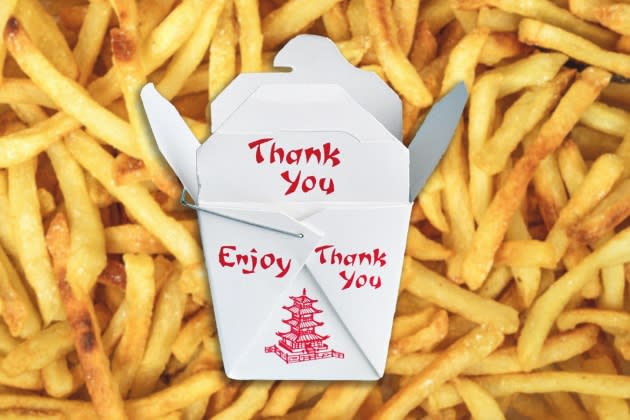U.K. Chinese Takeout Is Viral On TikTok. We’re Missing The Bigger Story

“Did anyone order a Chinese?”
In a video that now has 5.2 million views TikTok, British food and fashion creator Charly Anne simply plates up her dinner for the night.
More from Rolling Stone
“I got a Chinese tonight. I’ve been craving a Chinese for so long and I thought we could dish it up together,” she says into the camera. As she speaks, she pulls out containers of curry sauce, french fries, chicken balls, chow mein noodles, crispy beef, and corn crackers. “How good does that look? I’m absolutely starving.”
@charlyannec Dish up my chinese with me 😍🍽 #eatwithcharly #whatcharlyeatsinaday
♬ original sound – Charly Anne C
But in her comments section, usually filled with agreements or suggestions for other meals, Charly Anne’s video was met with utter confusion from her American followers.
‘This is so [different] from the states.”
“I’m so glad to be American because we do Chinese takeout differently.”
“Are we being pranked?”
“What is going on right now?”
“Cries in confused American.”
Charly Anne posted her video on April 23. Less than two weeks later, videos of Brits plating their own Chinese takeaway orders became a legitimate trend, with the hashtag #chinesetakeaway reaching 333 million views. Other U.K. TikTokers jumped on the trend, plating their own takeaway hauls on camera, intricately explaining their favorites and specific orders dish by dish.
But soon, the sentiment began to shift. First, there was confusion. “Is it just me or is your FYP also almost exclusively British people eating Chinese food too?” popular American food creator Soogia asked, in a video that’s been viewed almost 3 million times. “All their plates look almost exactly the same and [are] filled with things that I don’t recognize as Chinese food, with the exception of, like, chow mein noodles. That’s so interesting to me.”
@soogia1 The Al Gore Rhythm can be so funny sometimes. #achinese #chinesefood #britishchinesefood #americanchinesefood #interestingcombination #currysauce #chickenballs #chips #greenscreenvideo
♬ Little Things – Tiqta
But as the trend grew, viewers from other countries began deriding the plates for how different they looked from traditional Chinese food. What began as jokes soon left British and U.K. creators’ comment sections filled with insults, calling their food beige, colonized, inauthentic, and downright disgusting.
Angela Hui, a food writer and commentator, tells Rolling Stone the viral takeaway trend, and its negative response, is missing key cultural and historical context. For Hui, Chinese takeaway isn’t disrespecting traditional food. Instead, it’s a story — her family’s story — of immigration and perseverance.
“What’s been really annoying is these really rude comments saying ‘This food is gross’ or beige or ‘this isn’t the Chinese food that I’ve come to know and love.’ But I think a lot of people just miss the whole context and history of it,” Hui says. “Old Chinese takeaways in the U.K. were booming post-war, in the 1950s and the 1960s, and took over old fish and chip shops. That’s why you get a lot of English dishes like chips, battered sausages, and pies alongside fried rice and chow mein. During that time, India was also under colonial rule, which is why curries and other sauces feature on the menus.”
Hui’s knowledge of U.K. takeaway isn’t just surface level. Her parents started their own South Wales take-out shop in 1988, which they ran for almost 30 years before they retired in 2018. Hui grew up working behind the counter, an experience that eventually gave birth to her 2019 memoir Takeaway: Stories from a Childhood Behind the Counter. She tells Rolling Stone that seeing such frustrating and misinformed takes on U.K. Chinese food being inauthentic made her desperate to talk about it — especially because growing up has allowed her to see how their Chinese takeaway shop became about much more than food.
“It was a very different time when my parents settled in the U.K. in the Eighties. There was a lot of racism, there was vandalism and attacks on the shop,” says Hui, whose parents came to Wales from China and Hong Kong in 1985. “Food was the connector for people to understand more about different cultures. Over time, my parents [and other takeaway owners] managed to carve out their own communities in these really rural posts. And that’s such a beautiful thing, to create almost like a hub for everyone to come in and share food and learn about one another. “
While takeaway discussions, and orders, have become commonplace online, this staple of many U.K. communities hasn’t had the best staying power. Following the Covid-19 pandemic, many Chinese restaurants in the United States and U.K. reported declining orders and increasing closures — which were linked to anti-Asian prejudices. While Hui says she’s sure TikTok can’t single-handedly save Chinese family restaurants, she’s glad the ongoing debate has given these small businesses some time in the spotlight and a little more cash.
“The internet is a really hard place to have an in-depth or level-headed, calm conversation. So I’m just really glad that it’s opened up a discussion where people are learning more and understanding about each other and the differences between immigrant businesses,” Hui says. “The best thing to do is just support your independent businesses, especially in a time where it’s very scary for Asian families and we’re not sure what the future holds.”
Best of Rolling Stone
